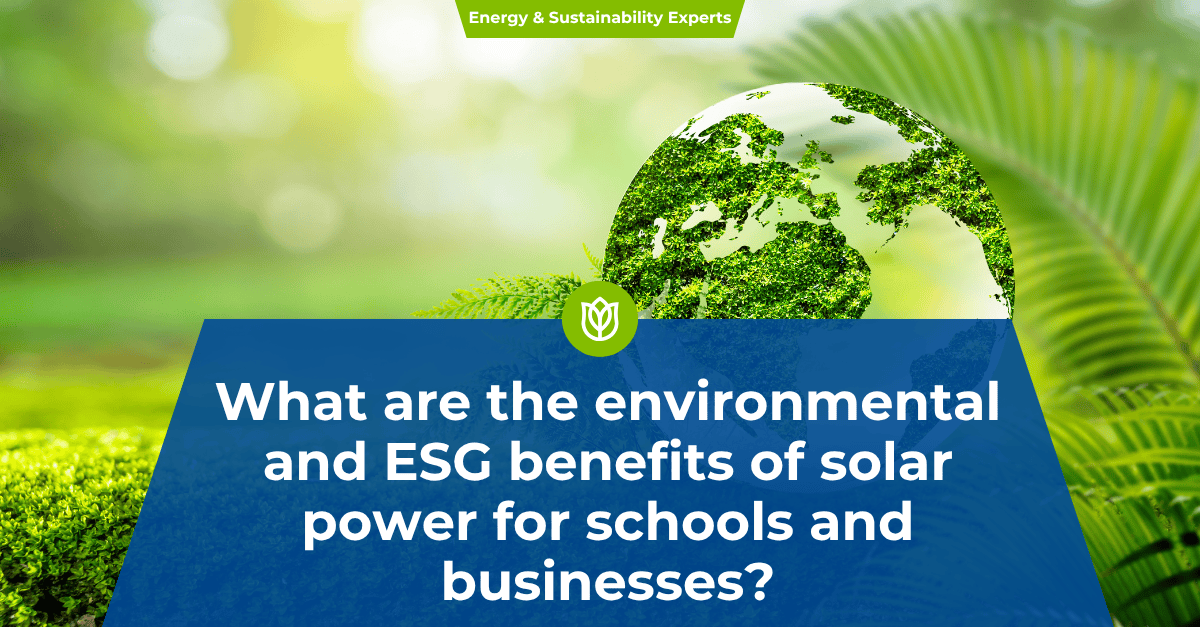Aside from the financial benefits, schools and businesses switching to solar energy can send a strong environmental message. Solar power is a strategic asset delivering measurable Environmental Social and Governance (ESG) benefits to the wider society. It directly reduces emissions, can earn carbon credits, enhances stakeholder trust and simplifies compliance by providing sustainability disclosure requirements.
Direct emission reductions and quantifiable impact
Installing a commercial solar photovoltaic system of around 250 kilowatts, typical for a medium-sized commercial building, can generate over 230,000 kilowatt hours annually in the UK. Assuming this displaces grid electricity from a mix that includes natural gas and some coal, the emissions avoided equate to roughly 55 tonnes of carbon dioxide equivalent each year. Scale this across a network of business sites and the figures become unignorable. A portfolio of ten similar sites could prevent over 500 tonnes of emissions annually.
These reductions are concrete and auditable, ideal for Scope 2 accounting under the Greenhouse Gas Protocol. Businesses with significant indirect energy emissions can immediately improve their carbon intensity metrics. Moreover, solar energy generation contributes to Scope 3 reductions for corporate tenants or clients using leased premises or services powered by that electricity.
Carbon credits and financial upside
Through schemes such as the UK Renewable Energy Guarantees of Origin (REGO) and voluntary carbon markets, solar installations can also yield financial instruments. Although REGO prices are currently modest, they can offer a long-term revenue stream or an internal carbon offset mechanism for companies with ambitious net zero plans.
In voluntary markets, high-quality credits associated with renewable installations that include monitoring and verification components can bring stronger value, especially when bundled with community or social benefit claims such as workforce development or local sourcing during installation. While not every business will monetise these credits, they add resilience and flexibility to decarbonisation strategies.
Stakeholder perception and brand value
Customers, investors and supply chain partners are scrutinising sustainability claims more closely than ever. This means that solar panels on your roof are not just functional assets. They are symbols of intent and transparency. For schools and customer-facing enterprises, they are visible proof of environmental commitment. For B2B operations, they support sustainability credentials critical for procurement decisions and partnership eligibility.
Institutional investors are now integrating ESG criteria into capital allocation models. A company that demonstrates active emissions reduction through solar adoption and other means is better placed to attract green finance or avoid ESG-related discounting. The reputational risk of climate inaction is real and solar power provides a visible and auditable ESG win.
Alignment with ESG reporting frameworks
The UK’s corporate ESG reporting environment is tightening. From the Task Force on Climate-related Financial Disclosures (TCFD) to the upcoming Corporate Sustainability Reporting Directive (CSRD) implementation for qualifying firms, the demand for verifiable emissions data is intensifying. Solar installations provide easily tracked, metered outputs that align neatly with these frameworks.
For example, TCFD-aligned reports require firms to disclose their transition strategy and emission reduction pathways. A solar deployment with monitored generation data directly supports these disclosures. Similarly, the carbon intensity of power used in operations, a key metric in many ESG ratings, is drastically improved through on-site renewables.
Regulatory and policy tailwinds
UK government incentives for commercial solar may not be as generous as previous Feed-in Tariff schemes, but the regulatory environment is increasingly favourable. Planning permission for rooftop solar has been relaxed. Business rates on solar arrays installed for self-use have been reduced or exempted under certain conditions. The Smart Export Guarantee ensures that excess generation can be sold to the grid.
These policies signal long-term alignment with climate objectives, reducing the regulatory risk associated with investment in solar infrastructure. Businesses that move early position themselves ahead of any future mandates or levies on carbon intensive operations.
Adopting solar is a strategic ESG decision with measurable benefits for business and schools. Emissions avoided are real, trackable and reportable. Carbon credits offer potential revenue and internal offset value. Stakeholder perception is strengthened. Compliance with ESG reporting frameworks becomes easier and more credible. For UK businesses serious about ESG, solar energy is one of the few investments that deliver environmental results, reputational returns and regulatory readiness in one move.
Interested in the solar potential of your business or school? Go to our Solar Calculator page for a free and non-obligation assessment report.







